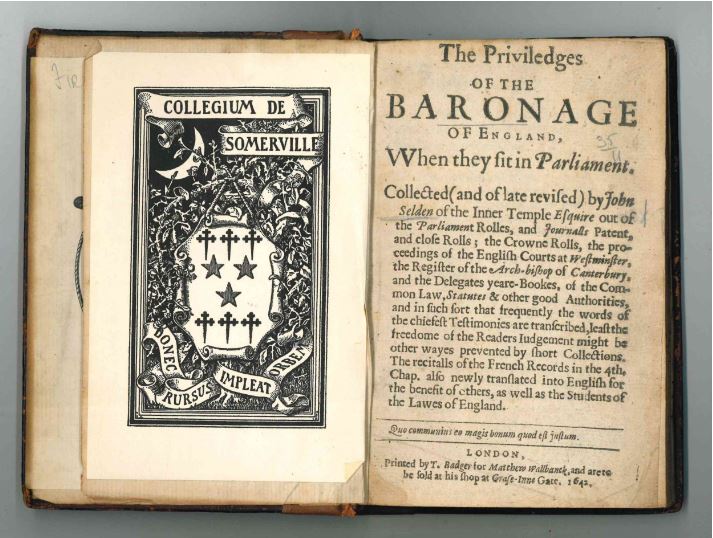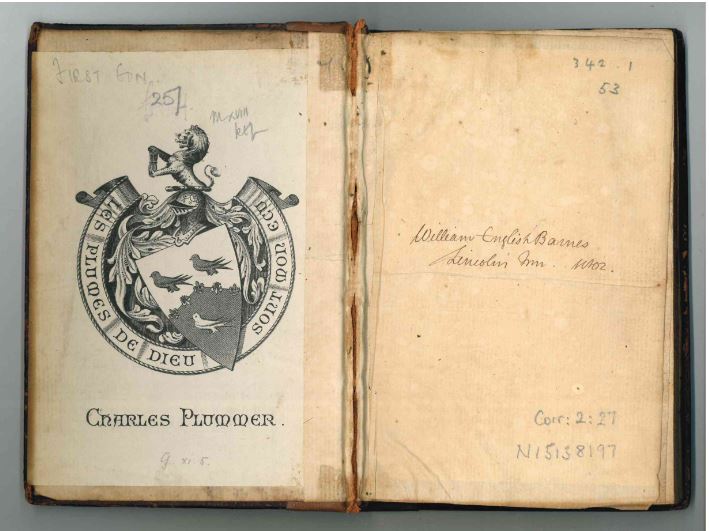Previous book of the term
Hilary Term 2022
The Priviledges of the Baronage of England, When they sit in Parliament by John Selden

John Selden was born on 16 December 1584 in the hamlet of Salvington in Sussex (now part of the town of Worthing). He attended the Prebendal Free School in Chichester, then entered Hart Hall (a predecessor of Hertford College) in Oxford. He left Oxford in 1602 without taking a degree – but it was not unusual at that time not to take a degree, unless intending to enter either academia or the church. Selden’s interest was the law, which Oxford undergraduates at that time could not study; he therefore moved to London, where he pursued the usual course for a student of law, which was to enter one of the Inns of Chancery, then one of the Inns of Court – in Selden’s case, the Inner Temple – and was called to the bar (and could therefore plead a case before a judge) on 14 June 1612.
But Selden’s interests were not limited to the legal knowledge he needed to practise as a lawyer. He was also deeply interested in the history of law, in tracing laws back to their foundations and seeing how they developed over time. His first book, published in 1610, was The Duello, or, Single Combat, a brief history of trial by single combat in England, and was followed in the same year by Jani Anglorum facies altera, a short treatise in Latin in which he endeavours to trace the origins and growth of English secular law from the time of the earliest records to the end of the reign of Henry II. Two years later the poet Michael Drayton published the first part of his Poly-Olbion, a description of England and Wales in verse going through county by county, which included ‘illustrations’ by Selden explaining various historical and mythological allusions – Selden’s learning was by no means limited to legal matters alone.
Over the next few years, among other works he published Titles of Honor, in which he traced the origins and transformations of titles such as Duke and Count, De Dis Syris, a substantial treatise on the gods of peoples other than the Jews mentioned in the Old Testament, and a history of tithes – the money which was levied to pay for the upkeep of churches and clergy, and which Selden demonstrated was not a continuation of the Jewish Temple tithes, but a custom which had grown up in the early Middle Ages. This was a controversial conclusion when received opinion at the time was that tithes were collected by divine right.
In 1621 the House of Lords set up a committee to look into the privileges accorded to the Lords when sitting in Parliament, both as a body and as individuals. Selden was one of the antiquarians appointed to research precedents, and the book displayed here sets forth the fruits of his researches, published in 1642. The range of sources listed on the title page shows how conscientious he was, and his commitment to the then rather novel idea that historical research was best carried out by seeking out primary sources as close in time to the events they recorded as possible, rather than relying on what were considered to be authoritative secondary texts. The ‘baronage’ referred not just to those with the title of baron, but all those members of the nobility summoned to sit in Parliament; their main privileges included the right to appoint proxies, freedom from lawsuits for the duration of a Parliament, freedom of speech in proceedings, and the right to give their word of honour rather than swear an oath.
In 1624 Selden entered Parliament himself, as a member of the House of Commons, and from 1640 served as the member for the University of Oxford. His legal expertise and profound knowledge of historical precedents were much in demand, and he served on numerous committees. He remained an MP through the turbulent times leading up to and during the English Civil War, his belief, based on his historical researches, that the English constitution was one in which sovereignty was shared among monarchs, lords spiritual and temporal, and commons putting him in the Parliamentarian camp, opposing the absolutist tendencies of the King. However, in 1648 he was barred from his seat in ‘Pride’s Purge’, when all those who favoured negotiating with Charles I rather than calling for his trial and execution were excluded from the Commons.
Selden retired to his extensive scholarly researches into the history and development of laws and customs, his final work, unfinished at his death on 30 November 1654, being a monumental study of the Sanhedrin and other judicial bodies of the ancient Hebrews. He bequeathed the majority of his vast personal library to the Bodleian, and in 1659 over 8,000 volumes of books and manuscripts were received and housed in the newly-built West End, which became the Selden End of Duke Humfrey’s.
This book bears evidence of two previous owners before it came to Somerville:
